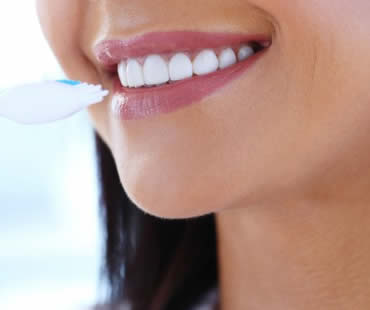
Aug 12, 2022 | Dental Topics 3, Dental Information, Blog
It can be difficult to avoid the signs of aging and lifestyle on your teeth. They can become stained or yellowed over the years, but they don’t have to remain that way. You might choose to have your smile professionally brightened at your dentist’s office, but you’ll want to maintain those pearly whites. Here are some tips you can follow at home to keep your smile bright and beautiful.
Eat crunchy foods.
Crunchy foods are often acidic, which means they naturally help clean your teeth. Examples include apples, pears, celery, and carrots. Crunchy foods are also more abrasive, so the cleaner your teeth will become as they are naturally scrubbed during chewing. The cleaning benefit comes with the crunch, so eat them in their whole form instead of cutting or crushing them up.
Consume dairy products.
Foods like milk, cheese, and yogurt contain minerals such as phosphorus and calcium. These mineral help strengthen your teeth and make them whiter. Your smile will be more appealing and healthier when you include dairy in your diet.
Don’t forget strawberries.
The malic acid in strawberries helps reduce tooth discolorations, and the rough texture of the fruit buffs your tooth enamel. This creates a smoother and brighter look. In addition to eating strawberries, you can also crush them to mix with a half teaspoon of baking soda and a bit of lemon juice. Apply this mixture onto your teeth for five minutes to improve their appearance.
Try baking soda.
As mentioned above, baking soda can help clean teeth if used in moderation. Rub a pinch of baking soda onto your teeth and then rinse it away, or mix it with hydrogen peroxide and salt to naturally brighten your smile.
Use a straw.
If you can’t eliminate dark beverages like wine or colas from your diet, drink them from a straw so that the liquid goes straight into your mouth instead of over your teeth.
Get an electric toothbrush.
Stubborn stains on tooth surfaces are often more responsive to cleaning with an electric toothbrush instead of a manual one.
Our dental office is located in Central Falls

Jul 2, 2021 | Dental Topics 3, Cosmetic Dentistry, Blog
Dentists today are no longer focused only on looking for tooth decay and correcting oral health issues. Cosmetic dentistry also offers smile makeovers, which is the process of using various procedures and treatments to create a brand new smile.
There are many things that go into an appealing smile. Ideally, your bite should fit together properly, teeth should be straight and white, gums should correspond with your teeth well, and more. When one or more of these factors isn’t there, your smile may not the one you’ve dreamed of having. A smile makeover can take care of all that.
Teeth whitening
Teeth that are yellowed and dingy can make an otherwise nice smile look uncared for and unhealthy. Transforming stained dull teeth into shiny pearly whites can make a huge impact. Professional teeth whitening is a simple and effective way to boost your smile in just an hour.
Reshaping teeth
If your issue involves the shape or size of your teeth, bonding or porcelain veneers can come to the rescue. Teeth that have been worn down from years of use or bad habits can be restored, or the edges of teeth that aren’t uniform can be corrected. Bonding may be done in a short time in one dental visit, and veneers takes a few weeks but can dramatically change your smile.
Gum contouring
Your gums might be too high or too low on your teeth, creating an appearance of teeth that are too large or small. Gum contouring restructures your gums so that they fall in a more appealing place along your teeth, forming a nice line in a better location.
Misalignment
A great smile begins with a proper bite, so making sure your teeth fit together correctly when your mouth is closed is an important element of a smile makeover. If your bite or your teeth need to be realigned, you might choose Invisalign clear aligners. This innovative system provides an alternative to traditional braces and allows correction without cumbersome or embarrassing metal in your mouth.
Our dental office is located in Central Falls

Apr 22, 2022 | Dental Topics 3, Dental Information, Blog
It’s easy to remember the basics about dental health. Most people know that they need to brush twice a day, floss often, and schedule checkups every six months. The following questions and answers offer important information about your oral health.
How does the dentist find a cavity?
Although some practices now have technology to aid in cavity detection, many dentists check the old-fashioned way. During your exam, the dentist uses a metal instrument to touch the surface of your teeth. If the tooth feels soft, that may indicate the presence of tooth decay.
What’s the difference between amalgam and composite fillings?
For years, metal filling were the choice for repairing teeth damaged by cavities. Over time, amalgam fillings can darken as well as change shape, which can cause them to leak. Now, composite fillings are often used instead. These tooth-colored restorations keep your smile looking good, and they allow for more conservative therapy.
Does teeth whitening work?
If you want a stunning smile, professional teeth whitening can give you beautiful results in many cases. For certain types of discolorations, like tetracycline staining, teeth bleaching may not work, but you could consider other options like porcelain veneers.
Can an adults straighten their teeth?
Absolutely. There is no age limit on a vibrant smile and about 25 percent of orthodontic patients are over 18 years of age. Modern treatment options such as Invisalign clear aligners allow adults to straighten teeth without the embarrassment or discomfort of metal braces.
Is an electronic toothbrush better than a manual toothbrush?
Most dentists agree that the best toothbrush is the one that encourages you to brush. Electronic brushes have benefits including ease of use and more thorough coverage. With manual brushes, they are inexpensive and can be easily replaced/
Our dental office is located in Central Falls

Sep 9, 2022 | Dental Topics 3, Dental Information, Blog
Waiting for the birth of a baby is an exciting time for any woman. Your body changes in many ways, including in your mouth. Though picking out names and nursery colors is important, taking proper care of your teeth and gums before, during, and after pregnancy will keep your oral health on track. These tips can help you keep your vibrant smile in top shape.
Before Pregnancy
While you are trying to conceive, schedule an appointment with your dentist. At this visit, the dental team can clean your teeth, examine your mouth, and address any issues before you have a baby on the way. Because x-rays are not recommended during pregnancy, this appointment is a good time to have those taken as well.
During Pregnancy
If you are pregnant make sure to tell your dentist right away. Procedures like cosmetic enhancements and X-rays should be avoided during pregnancy. Checkups are very important when you are pregnant, so don’t skip your visit. As a precaution, you should wait until the second trimester to see your dentist.
While your pregnancy progresses, watch for signs of pregnancy gingivitis, which usually involves tenderness, bleeding, or swollen gums. Talk with your dentist if these symptoms appear. Practicing good oral care and eating right will help minimize any impact on your oral health.
After Pregnancy
When you feel up to it, visit your dentist after delivery for a full evaluation of your oral health. Your dental provider can work out a detailed plan to address any issues from the pregnancy and renew your smile.
If you live in the Central Falls area contact us today

Mar 31, 2023 | Dental Topics 3, Dental Information, Blog
For many years, dentists removed cavities and filled them with metal amalgams. Traditional metal fillings are less expensive and were often the first choice for fixing damaged teeth. Recently, composite resin fillings have become the top method for restoring smiles. Ultimately, the decision rests with the patient; however, many dentists have moved to placing only composite fillings.
Silver fillings actually weaken the natural tooth structure, although they do repair the decayed area. As well, metal fillings contain mercury, which can become toxic in large doses. Metal fillings can expand, contract, or leak from wear over time. In many cases, they also darken with age.
Tinted to match natural teeth, composite resin fillings preserve your bright, white image. With composite resin fillings, less tooth area needs to be removed, which keeps as much of your original tooth in tact as possible. Because tooth-colored fillings actually bond to the tooth, you don’t have to worry about these restorations changing shape or cracking.
To place a composite restoration, your dentist will clean out the decay and prepare the tooth. Then, the doctor will fill the area with the composite material. With a special curing light, your dentist hardens the filling and polishes the tooth.
When you have metal fillings, check with your dentist and request an evaluation of their stability. Some people choose to replace amalgam fillings because of the way they look. If your old fillings develop additional decay or fracture, you will need to have the restorations repaired in order to restore the tooth.
Schedule a dental cleaning appointment today at our Central Falls dentists office.

Jun 27, 2024 | Dental Topics 3, Dental Information, Blog
Every hour, one American loses the battle with oral cancer. In fact, oral cancer kills more people than liver, cervical, or testicular cancer. Recently, Michael Douglas shined a spotlight on this illness by revealing his own battle with the disease, after a malignant tumor was discovered at the base of his tongue, near the back of his throat.
Although men have as greater risk of developing oral cancer than women, and tobacco use increases your odds, 25 percent of oral cancer victims have no lifestyle risk factors.
You can follow these tips to keep your mouth healthy:
• Visit the dentist regularly. Your provider is trained to know what is normal and what isn’t. During your routine exam, the doctor will evaluate your teeth and gums, looking for anything out of the ordinary. At Brown, Reynolds & Snow Dentistry, we also offer ViziLite Plus cancer screening. ViziLite Plus uses technology that helps the dentist identify soft tissue abnormalities that may develop into cancer.
• Watch for unusual signs. Common symptoms of oral cancer include unusual bumps or thickenings, unexplained bleeding in the mouth, hoarseness, and voice changes. Contact your dentist right away if you develop any of these symptoms.
• Cut out tobacco and alcohol. Smokers have six times the risk of developing oral cancer as non-smokers. As well, heavy drinking increases your chances of receiving an oral cancer diagnosis.
• Perform a self-exam. Early detection substantially improves your odds of survival with oral cancer, so examine your lips, gums, cheeks, tongue, and the roof of your mouth at least once a month.
• Limit sun exposure. When you do go outside, apply sunscreen to your lips for added protection against harmful UV rays.
It’s time for your dental check up at our Central Falls dental office.








